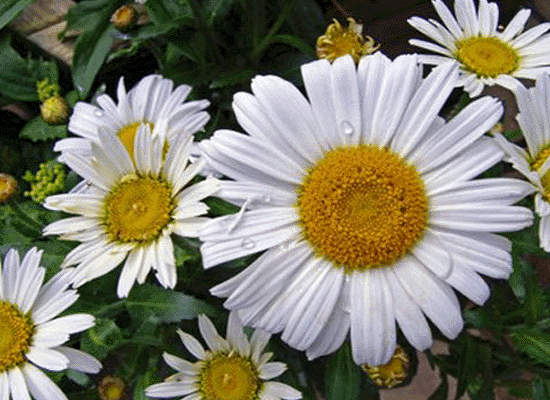Chemicals for Use in Organic Gardening
As mentioned before, organic gardening is primarily about reducing and avoiding the use of chemicals in the garden. This is a basic requirement of organic systems and is there to protect the soil, environment, the flora & fauna. Avoiding the use of chemicals is a challenge to gardeners in many ways but it can also bring about opportunities and ideas about new ways to garden. The result being a more sustainable and manageable gardening system that can remain in place long into the future.

In previous articles we discussed in more detail the range of options open to gardeners to organically control against both weeds and pests. In that article I stated that there are a number of chemicals that have been approved by Organic Certification Bodies such as The Organic Trust & IOFGA. These chemicals are accepted for use in organic gardening because they are themselves, derived from natural sources. Many of the chemicals are very effective against the control of pests and because they are organic, they will breakdown naturally and not harm the environment.
Chemicals for Use in Organic Growing
Note: This list DOES NOT include the range of fertilisers & plant foods available for organic growing.
Pest Control
Pyrethrum Naturally occurring chemical derived from the Chrysanthemum flower. This is a fast acting chemical. It works by 'knocking down' susceptible insects leaving them paralyzed. The chemical effects the nervous system, causing constant nerve twitches leading to paralysis.
Controls: Aphids, Blacfly, Greenfly, Whitefly, Thrips, Carrot Fly, Cabbage Root Fly & Spider Mites
Quassia This chemical needs to be ingested by the pests to have any effect. This would make it more 'specific' than pyretrum as the pest would have to cause plant damage to be affected. Quassia is a stomach toxin. Also Derived from plants, Quassia comes from the bark of the Quassia Amara plant and must be diluted in water. It is an example of an organic pesticide that has been used for hundreds of years.
Softsoaps These come in a variety of forms and work by washing or removing insects waxy coating causing the insect to desiccate and die. This is a slow form of death and works only on soft bodied insects including aphids, slugs and mealy bug. Some examples of soft soap include armilatox and ecover .
Sulphur Has many uses in and around the garden. Sulphur is often added to soils to make them more acidic, and it also breaks down cloddy soils while being a micro plant nutrient. In organic gardening, it is used as a fungicide. It controls black spot on roses, powdery mildew & scab.
Bacillus Thuringeinsis This is a bacteria that lives in the soil. If ingested by pests it works it's way into their stomach dissolves the stomach lining, killing the pest. This is a useful pesticide as it is quite specific and rarely kills beneficial insects while it will kill caterpillars.
Spinosad This is a fungus. It kills and controls a range of insects including caterpillars, beetles, aphids & thrips. This low in toxicity pesticide is safe for both the environment and humans.
Metaldehyde Commonly found in a range of slug tox or slug pellets. Metaldehyde works by causing the slimy coat of the slug or snail to dry out or desiccate. While this chemical is prohibited, it's use is controlled and restricted to small amounts.
Granulose Virus Preparation - This is a virus used to infect certain pests to control them. There are a range of virus strains used to control different pests. These viruses work best when the numbers are high as they can quickly spread through the population killing them off. As scary as they sound, they are safe for humans and the environment and pests need to ingest them to be infected. As yet they are not commonly available to buy or use.
Controls Codling Moth, Cabbage Worm, Cut Worm, Potato Tuber Moth & Caterpillars
Hydrolysed Proteins These can be used as an attracting agent where the pests are lured away from specific crops and to a trap. Generally used in conjunction with insecticides.
Weed Control
The options here are limited
Acetic Acid - Or industrial vinegar can be used to control weeds. This is the active ingredient in Irish Organic Weed Control products. Here the acid is about 15% while table vinegar is only 5%.
Corn Gluten Meal - This can be used to prevent new weeds from sprouting on lawns. It works by suppressing early stages of root formation in seedlings. This is also a plant fertiliser, high in Nitrogen.
Note: It will not kill existing weeds.








